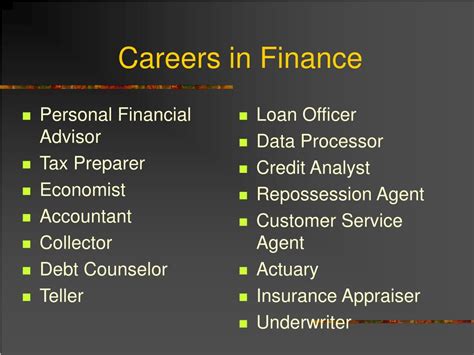Careers In Insurance

The insurance industry is a vast and diverse field, offering a multitude of career opportunities for individuals with various skill sets and interests. From underwriting and actuarial work to sales and customer service, the insurance sector provides a stable and rewarding career path. In this article, we will explore the diverse career paths within the insurance industry, delve into the skills and qualifications required, and uncover the potential growth and advancement opportunities that await professionals in this field.
Exploring the Diverse Career Paths in Insurance

The insurance industry is comprised of numerous roles, each playing a crucial part in ensuring the smooth functioning of the business. Here are some of the key career paths within the insurance sector:
Underwriting
Underwriters are the backbone of the insurance industry. They are responsible for assessing the risk associated with each insurance policy and determining the premium rates. With a keen eye for detail and a strong understanding of risk analysis, underwriters evaluate applications, review policy terms, and make informed decisions to ensure the financial stability of the insurance company. The role requires a combination of analytical skills, knowledge of insurance products, and a deep understanding of the industry’s regulations.
Actuarial Science
Actuaries are the mathematicians of the insurance world. They use statistical models and data analysis to assess the financial risks and determine the pricing of insurance policies. Actuaries play a vital role in developing pricing strategies, evaluating investment opportunities, and managing the overall financial health of insurance companies. A career in actuarial science requires a strong foundation in mathematics, statistics, and a deep interest in data-driven decision-making.
Insurance Brokers and Sales
Insurance brokers and sales professionals are the face of the insurance industry, interacting directly with clients and providing them with the right coverage. They possess excellent communication and interpersonal skills, building trust and understanding the unique needs of their clients. Brokers work independently or for insurance agencies, offering tailored insurance solutions to individuals, businesses, and organizations. The sales aspect of the insurance industry offers a dynamic and challenging career path, with opportunities for commission-based earnings and a rewarding sense of helping others.
Claims Adjusters and Investigators
When an insurance claim is filed, claims adjusters and investigators step in to evaluate the validity and extent of the claim. They assess the damages, gather evidence, and determine the appropriate compensation. This role requires a combination of analytical skills, attention to detail, and strong communication abilities. Claims adjusters work closely with policyholders, providing support and guidance throughout the claims process. The work can be challenging, as it involves negotiating and resolving disputes, but it also offers a sense of satisfaction in helping individuals and businesses recover from unforeseen circumstances.
Risk Management and Compliance
Risk management professionals focus on identifying, assessing, and mitigating potential risks within an insurance organization. They develop strategies to minimize financial losses, ensure compliance with regulations, and protect the company’s reputation. Risk managers work closely with other departments, providing guidance and support to ensure the organization’s overall resilience. This role requires a strong understanding of insurance products, regulations, and a proactive approach to managing risks.
Customer Service and Support
Insurance companies rely on a dedicated customer service team to provide support and assistance to policyholders. Customer service representatives handle inquiries, process requests, and ensure a positive customer experience. They act as the first point of contact, resolving issues and providing accurate information. The role requires excellent communication skills, empathy, and a thorough understanding of insurance policies and procedures. Customer service professionals play a crucial role in building and maintaining strong relationships with clients.
Insurance Operations and Administration
Behind the scenes, insurance operations and administration professionals ensure the smooth functioning of the insurance company. They handle a wide range of tasks, including policy administration, data management, and back-office support. This role requires strong organizational skills, attention to detail, and a willingness to adapt to changing industry trends and regulations. Insurance operations professionals play a vital role in streamlining processes, optimizing efficiency, and maintaining accurate records.
Skills and Qualifications for a Successful Insurance Career

The insurance industry values a diverse range of skills and qualifications, depending on the specific career path chosen. Here are some key skills and qualifications that can pave the way for a successful career in insurance:
Analytical and Critical Thinking Skills
Insurance professionals, particularly those in underwriting, actuarial science, and risk management, require strong analytical skills. The ability to evaluate complex data, identify patterns, and make informed decisions is crucial. Critical thinking skills allow professionals to approach problems from different angles and develop innovative solutions.
Communication and Interpersonal Skills
Effective communication is essential in the insurance industry. Whether it’s interacting with clients, colleagues, or stakeholders, insurance professionals must possess excellent verbal and written communication skills. The ability to listen actively, explain complex concepts in a simple manner, and build strong relationships is highly valued across all insurance career paths.
Attention to Detail and Accuracy
Insurance work often involves handling large amounts of data and critical information. Professionals in underwriting, claims adjusting, and customer service must possess a high level of attention to detail to ensure accuracy in their work. Mistakes can have significant financial implications, so precision and a meticulous approach are essential.
Knowledge of Insurance Products and Regulations
A deep understanding of insurance products, policies, and industry regulations is crucial for success in the insurance sector. Professionals must stay updated with the latest trends, changes in legislation, and emerging insurance products. This knowledge enables them to provide accurate advice, make informed decisions, and ensure compliance with legal requirements.
Problem-Solving and Decision-Making Abilities
Insurance professionals often face complex challenges and must make quick, informed decisions. Strong problem-solving skills, combined with the ability to analyze various options and select the most suitable course of action, are highly valued. The insurance industry relies on individuals who can think critically, assess risks, and provide effective solutions.
Adaptability and Flexibility
The insurance industry is constantly evolving, with new products, technologies, and regulations emerging. Professionals who can adapt to change, embrace new challenges, and remain flexible are highly sought after. The ability to learn and apply new skills is essential for long-term success and growth within the insurance sector.
Advancement Opportunities and Career Growth
The insurance industry offers a wealth of opportunities for career growth and advancement. With a combination of experience, skill development, and a willingness to take on new challenges, professionals can progress through various roles and positions.
Professional Development and Education
Continuing education and professional development are highly encouraged in the insurance industry. Many insurance professionals pursue advanced degrees, certifications, and specialized training to enhance their skills and knowledge. This investment in personal growth can lead to increased responsibilities, higher earning potential, and greater career opportunities.
Leadership and Management Roles
As insurance professionals gain experience and demonstrate their expertise, they may have the opportunity to move into leadership and management roles. Team leads, department managers, and senior executives are responsible for overseeing teams, making strategic decisions, and driving the success of the organization. Leadership roles offer the chance to shape the direction of the company, mentor junior staff, and make a significant impact on the insurance industry.
Specialization and Expertise
Insurance professionals can also choose to specialize in a particular area, becoming experts in their field. Specialization allows individuals to develop a deep understanding of a specific insurance product, industry, or niche. This expertise can lead to consulting opportunities, speaking engagements, and a reputation as a thought leader in the insurance industry.
Entrepreneurship and Starting Your Own Business
For those with an entrepreneurial spirit, the insurance industry offers the opportunity to start their own brokerage or agency. Insurance professionals with a strong understanding of the industry, excellent sales and customer service skills, and a network of industry connections can establish successful independent businesses. This path provides the freedom to build a brand, set your own schedule, and have greater control over your career trajectory.
Industry Recognition and Awards
Insurance professionals who consistently deliver exceptional results and make significant contributions to the industry may be recognized through industry awards and accolades. These honors not only bring personal satisfaction but also enhance one’s reputation and open doors to new opportunities. Industry recognition can lead to speaking engagements, media appearances, and invitations to join prestigious industry associations.
Conclusion
The insurance industry presents a myriad of career opportunities, catering to a wide range of skills and interests. Whether you thrive in a numbers-driven role, enjoy interacting with clients, or prefer working behind the scenes, the insurance sector offers a fulfilling and stable career path. With the right skills, qualifications, and a commitment to continuous learning, professionals can embark on a rewarding journey of growth and advancement within the insurance industry.
What are the entry-level positions in the insurance industry?
+Entry-level positions in the insurance industry vary depending on the specific career path. Some common entry-level roles include customer service representatives, sales agents, and claims adjusters. These positions provide a solid foundation for learning about the industry and gaining valuable experience.
What qualifications are needed to work in insurance?
+The qualifications required for insurance careers vary by role. For many positions, a bachelor’s degree in a relevant field such as finance, economics, or business is preferred. Additionally, obtaining industry-specific certifications, such as the Certified Insurance Counselor (CIC) or Chartered Property Casualty Underwriter (CPCU), can enhance your credentials and open up more opportunities.
What are the earning potential and salary ranges in the insurance industry?
+Earning potential in the insurance industry varies widely depending on factors such as role, experience, and company size. Entry-level positions typically offer a base salary with potential for commission-based earnings. More senior roles, such as actuaries or insurance executives, can command higher salaries, with some earning six-figure incomes.
How can I stay updated with industry trends and regulations in insurance?
+To stay updated with industry trends and regulations, insurance professionals can join industry associations, attend conferences and workshops, and subscribe to reputable insurance publications. Engaging with colleagues and mentors within the industry can also provide valuable insights and keep you informed about the latest developments.



